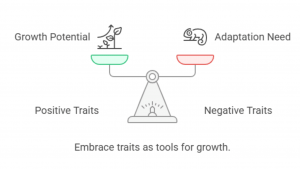In a world that often celebrates extroverted qualities, many individuals struggle to appreciate their natural temperament. Understanding how your position on the introvert and extrovert traits affects your mental health can be transformative. This article of Công dân của thế giới explores how embracing your unique personality style whether introverted, extroverted, or somewhere in between can significantly enhance your psychological well-being and life satisfaction.
The Personality Spectrum: Beyond Simple Labels
When we discuss introversion and extroversion, we’re not simply categorizing people as “shy” versus “outgoing.” These personality dimensions represent complex neurological and psychological traits that influence how we process stimulation, interact with others, and recharge our mental energy.
Introverts typically derive energy from solitude and internal reflection, while extroverts gain vitality through social interaction and external activities. However, most people exist somewhere along this spectrum rather than at either extreme.
Dr. Katherine Fabrizio, a clinical psychologist specializing in personality research, explains: “Understanding your place on the introversion-extroversion spectrum isn’t about limiting yourself with labels it’s about recognizing your natural tendencies so you can work with them rather than against them.”
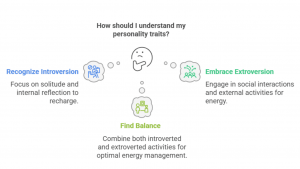
The Science Behind Our Social Preferences
Research in neuroscience has revealed fascinating differences in how introverted and extroverted brains respond to stimulation. Introverts typically have higher baseline arousal in their brains, making them more sensitive to external stimuli. This explains why busy environments can feel overwhelming to introverts they’re already operating at a higher level of mental activity.
Extroverts, conversely, have lower baseline arousal levels and seek additional stimulation to reach their optimal state. This biological difference drives many behavioral patterns we associate with these personality types.
“It’s not that introverts don’t enjoy people,” says Dr. Elaine Aron, researcher and author on high sensitivity. “Rather, their nervous systems process stimulation more intensively, leading to quicker mental fatigue in highly stimulating environments.”
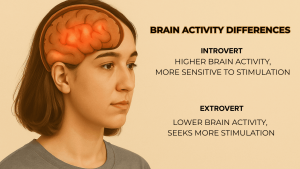
The Hidden Costs of Fighting Your Nature
Many individuals spend years attempting to adapt their natural tendencies to fit cultural or professional expectations. This often creates significant psychological strain that can manifest in various ways:
The Extrovert Ideal and Its Impact
Western culture particularly values extroverted traits like assertiveness, sociability, and quick decision-making. Schools and workplaces frequently reward extroverted behaviors while inadvertently penalizing introverted qualities like deep thinking and careful reflection.
This cultural bias creates what psychologist Susan Cain calls “the extrovert ideal”, the omnipresent belief that the ideal self is gregarious, alpha, and comfortable in the spotlight.
For introverts, this creates a particular challenge. Many report feeling pressure to “perform extroversion,” leading to what psychologists term “introvert hangover”, the mental and physical exhaustion that follows extended periods of forced socialization.
The Lesser-Discussed Struggles of Extroverts
While introverts’ challenges in an extrovert-centric world are increasingly recognized, extroverts face their own set of difficulties. In situations requiring extended solitude or quiet concentration, extroverts may experience restlessness, decreased motivation, and even anxiety.
During the COVID-19 pandemic, for instance, many extroverts reported significant mental health challenges during isolation periods. Without their typical sources of energy and stimulation, some extroverts encountered depression and anxiety at higher rates than usual.
Unconscious Processes Shaping Our Social Identity
Our position on the introversion-extroversion spectrum is influenced by both genetic predispositions and early developmental experiences. Often, these formative experiences create unconscious patterns that continue to shape our social behaviors throughout adulthood.
Early Attachment and Personality Development
Attachment theory offers valuable insights into how early relationships affect our comfort with social connection versus independence. Secure attachment in childhood typically allows for healthy development regardless of innate temperament, while insecure attachment patterns can create compensatory behaviors that mask our natural tendencies.
Dr. James Coan, attachment researcher at the University of Virginia, notes: “Early relationships provide templates for how we engage with others. An introvert with secure attachment may feel comfortable setting boundaries around their need for solitude, while one with anxious attachment might override their needs to maintain relationships.”
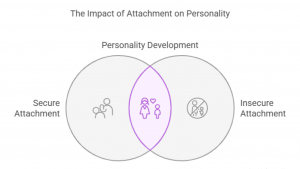
Cultural and Family Messaging
The implicit and explicit messages we receive about personality traits during childhood can profoundly impact our self-concept. A naturally extroverted child in a family that values quiet studious behavior might learn to suppress their exuberance, while an introverted child pushed into constant activities might develop anxiety around their need for downtime.
These unconscious adaptations often continue into adulthood, leading many people to live disconnected from their authentic personality needs.
Recognizing Your True Nature: Signs and Reflections
Identifying your natural tendencies requires honest self-reflection. Consider these indicators:
Energy Sources and Drains
- Where do you naturally turn when feeling depleted? Quiet solitude or energizing social connection?
- After a challenging day, do you recharge through conversation or through peaceful activities alone?
- How do you feel after extended periods of socialization versus extended solitude?
Processing and Decision-Making Styles
- Do you process experiences internally first or by talking them through with others?
- Are your best ideas generated in quiet reflection or through dynamic conversation?
- Do you prefer to consider decisions thoroughly before acting, or do you think best while in motion?
Practical Strategies for Personality-Aligned Well-being
Understanding your personality tendencies is only the first step. Implementing practical strategies to honor your natural style while developing necessary flexibility is key to enhanced well-being.
For Introverts: Honoring Your Needs While Engaging with the World
- Schedule deliberate downtime: Block recovery periods between social engagements to prevent energy depletion.
- Develop “social scripts”: Prepare conversation starters and transitions to reduce the cognitive load of social interactions.
- Choose the right environments: When possible, select settings with manageable stimulation levels quiet cafes over loud bars, small gatherings over large parties.
- Communicate your needs: Practice explaining your preferences without apology. Simple statements like “I enjoy our time together and also need quiet time to recharge” can help others understand.
- Leverage your strengths: Use your natural listening skills, depth of focus, and thoughtful analysis in both personal and professional contexts.

For Extroverts: Finding Stimulation While Developing Reflection Skills
- Create opportunities for healthy stimulation: Schedule regular social connections even during busy periods to prevent energy depletion.
- Develop mindfulness practices: Learn techniques that help you become comfortable with quieter states and internal reflection.
- Channel energy productively: When solitary work is necessary, incorporate movement breaks, background music, or other appropriate stimulation to maintain focus.
- Communicate your process: Help others understand that your thinking-out-loud approach or need for interaction is part of your natural style.
- Practice active listening: Develop your capacity to engage deeply with others’ thoughts rather than focusing primarily on expression.
The Ambivert Advantage: Finding Your Flexible Middle
Many people identify as ambiverts those who possess both introverted and extroverted tendencies depending on the context. This flexibility can be developed regardless of your natural leaning.
Psychologist Daniel Pink suggests that ambiverts may have distinct advantages in many situations, combining the thoughtfulness of introverts with the expressiveness of extroverts. Developing your less-dominant traits can expand your behavioral repertoire without denying your core tendencies.
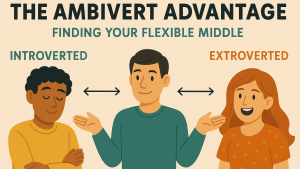
How Psychodynamic Psychotherapy Unlocks Authentic Personality Expression
Psychodynamic psychotherapy offers powerful tools for reconciling with your natural personality style and addressing unconscious patterns that may be creating inner conflict.
Uncovering Personality-Related Defense Mechanisms
Through the therapeutic relationship, psychodynamic therapy helps identify defensive patterns that may have developed around your natural temperament.
For instance, an introvert might discover they developed people-pleasing tendencies to compensate for perceived social inadequacy, while an extrovert might recognize their constant activity serves to avoid uncomfortable emotions.
“Many clients discover they’ve developed complex adaptations to fit expected norms,” explains Dr. Jonathan Shedler, psychodynamic researcher and clinician. “These adaptations served important purposes earlier in life but often become restrictive as adults.”
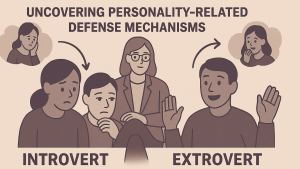
Resolving Internal Conflicts About Identity
The psychodynamic approach addresses the inner tensions many people experience between their authentic personality needs and internalized expectations. Through exploration of early experiences, clients often recognize how childhood dynamics shaped their self-concept and emotional responses to their own personality traits.
For example, an introverted client might work through feelings of shame around their need for solitude if they grew up in a family that equated sociability with worth. An extroverted client might explore why they feel uncomfortable with their own enthusiasm if it was once criticized as “too much.”
Developing True Self-Awareness Through Therapeutic Presence
Unlike approaches focused solely on symptom management or behavior change, psychodynamic therapy helps develop genuine self-knowledge through the experience of being fully seen and accepted.
“The therapeutic relationship provides a unique opportunity to explore personality in a non-judgmental space,” notes Dr. Nancy McWilliams, psychoanalytic theorist and practitioner. “When clients experience acceptance of their authentic tendencies, whether introverted or extroverted, they often discover new freedom to express themselves genuinely.”
This process typically involves working through the emotional weight of past experiences where your natural temperament was misunderstood or devalued, allowing for new, healthier relationships with these core aspects of yourself.

Embracing Your Authentic Self: The Path Forward
Integrating your natural personality style into your life represents an ongoing journey rather than a destination. This process involves:
Flexibility Without Self-Betrayal
Developing adaptability across different situations doesn’t mean abandoning your core needs. Learning to temporarily step outside your comfort zone while honoring your fundamental requirements for well-being represents mature personality integration.
Compassionate Self-Acceptance
Releasing judgment about your natural tendencies creates space for authentic growth. Instead of viewing personality traits as “good” or “bad,” consider them as different tools suited to different circumstances.
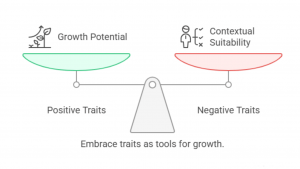
Community and Connection
Finding others who appreciate your natural style can provide crucial validation. Whether through friendships, support groups, or online communities, connection with those who understand your experience can be profoundly healing.
Conclusion: Your Uniqueness as Strength
In embracing your position on the introversion-extroversion spectrum, you unlock access to your natural strengths and authentic expression. Rather than fighting against your innate tendencies, working with them creates a foundation for lasting psychological well-being.
As pioneering psychologist Carl Jung who first popularized the concepts of introversion and extroversion observed: “The privilege of a lifetime is to become who you truly are.” [1]
By honoring your unique personality style while developing necessary flexibility, you create the conditions for genuine fulfillment and contribution to the world around you. Whether through self-directed practice or professional therapeutic support, the journey toward personality authenticity represents one of life’s most rewarding psychological achievements.
[1] https://www.simplypsychology.org/carl-jung.html

